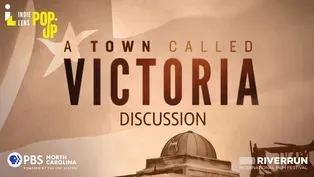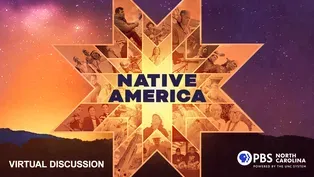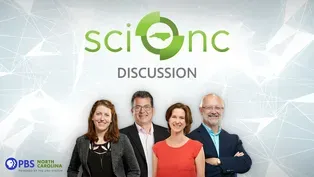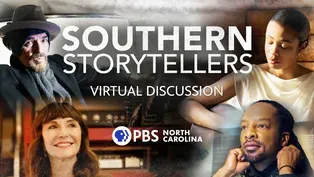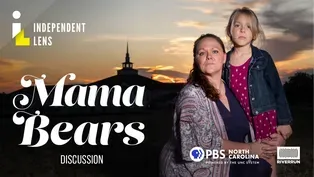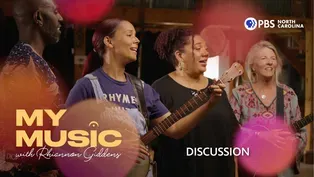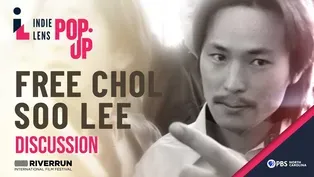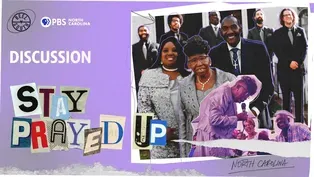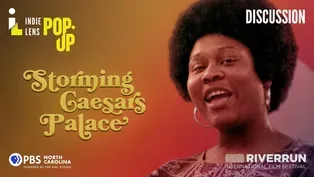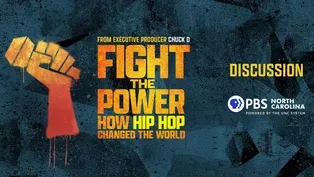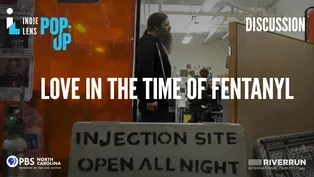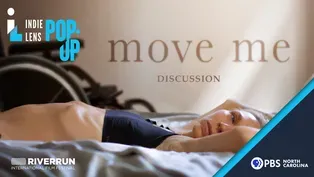PBS North Carolina Specials
Discussion | Independent Lens: Try Harder!
4/5/2022 | 36m 2sVideo has Closed Captions
PBS NC talks about the stress and high stakes of the college application process.
PBS NC’s CEIO Melissa Rihm Thibault, Ph.D., hosts NCSU director of strategic initiatives, Ronnie Chalmers, Dean Lori Newnam, NCSSM, and school counselors Yvonne Corcho and Trevor Echols as they help parents and educators guide students through the college application and admissions process and advise how to navigate and encourage alternative educational paths fitting individual student needs.
PBS North Carolina Specials
Discussion | Independent Lens: Try Harder!
4/5/2022 | 36m 2sVideo has Closed Captions
PBS NC’s CEIO Melissa Rihm Thibault, Ph.D., hosts NCSU director of strategic initiatives, Ronnie Chalmers, Dean Lori Newnam, NCSSM, and school counselors Yvonne Corcho and Trevor Echols as they help parents and educators guide students through the college application and admissions process and advise how to navigate and encourage alternative educational paths fitting individual student needs.
How to Watch PBS North Carolina Specials
PBS North Carolina Specials is available to stream on pbs.org and the free PBS App, available on iPhone, Apple TV, Android TV, Android smartphones, Amazon Fire TV, Amazon Fire Tablet, Roku, Samsung Smart TV, and Vizio.
Providing Support for PBS.org
Learn Moreabout PBS online sponsorshipMore from This Collection
Discussion - A Town Called Victoria - Independent Lens
Video has Closed Captions
The filmmaker and former Victoria residents share their story. (46m 51s)
Discussion - Native America Season 2
Video has Closed Captions
Panelists discuss preserving the languages of Native American tribes. (39m 1s)
Video has Closed Captions
Sci NC executive producer and host, Frank Graff, chats about upcoming Season 6 of Sci NC. (26m 6s)
Discussion - Southern Storytellers
Video has Closed Captions
Author David Joy and others discuss storytelling and their new PBS series. (42m 13s)
Discussion - Mama Bears | Independent Lens
Video has Closed Captions
Producer and director Daresha Kyi discusses the film and LGBTQIA+ advocacy. (34m 41s)
Discussion - My Music with Rhiannon Giddens
Video has Closed Captions
Discussing the series with producers Will & Deni McIntyre and country artist Rissi Palmer. (39m 56s)
Discussion - Free Chol Soo Lee | Independent Lens
Video has Closed Captions
Local lawyers, professors and nonprofit leaders discuss wrongful convictions and reentry. (40m 44s)
Discussion - Stay Prayed Up, Reel South
Video has Closed Captions
The filmmakers discuss their journey with Mother Perry and The Branchettes. (45m 4s)
Discussion - Storming Caesars Palace | Independent Lens
Video has Closed Captions
Local professors and nonprofit leaders discuss welfare and the social safety net. (33m 2s)
Discussion - Fight the Power: How Hip Hop Changed the World
Video has Closed Captions
Local experts discuss the history of hip hop with PBS North Carolina. (59m 43s)
Discussion - Love in the Time of Fentanyl | Independent Lens
Video has Closed Captions
Local harm reductionists, therapists and others discuss the opioid crisis and more. (55m 44s)
Discussion | Independent Lens: Move Me
Video has Closed Captions
A dancer with blindness and disability advocates discuss adaptable arts programs. (38m 46s)
Providing Support for PBS.org
Learn Moreabout PBS online sponsorship- Good evening, everybody.
Thank you so much for joining us for this preview screening of "Try Harder!"
I'm Melissa Rihm Thibault, Chief Education Innovation Officer at PBS North Carolina, your statewide public media network, and one of the nation's largest PBS affiliate.
We're really proud to bring you content like the film you just watched from this long running and award-winning PBS series, "Independent Lens".
We continually strive to bring you content that educates, informs and entertains.
Now I'm delighted to introduce some special guests this evening.
Joining us are Lori Newnam, Trevor Echols, Ronnie Chalmers, Yvonne Corcho, all experts and resources for you in the areas of school counseling and admissions.
We're gonna start with Lori Newnam.
We have a question for you Lori, and if you would also introduce yourself as a part of your introduction.
So Lori, coming from a high achieving high school, the North Carolina School of Science and Mathematics, to what degree do you see your students putting insurmountable pressure on themselves to get into an Ivy League or selective colleges?
- Hi, thank you.
Just to tell you a little bit about myself.
Yeah, my name is Lori Newnam.
I'm from Dean of Counseling at the North Carolina School of Science and Math.
I've been there about 17 years and in my role there, I've been able to support students with college and career planning, academic planning, and personal counseling.
So in regards to the question, I don't think the North Carolina School of Science and Math is alone and kind of in seeing students experience these high levels of stress.
I have the fortune to have a lot of great colleagues across North Carolina that I collaborate with with, and work with, and hear about students across our state.
And I think students in all schools are feeling this insurmountable stress to get into these select few colleges.
I think some of that has come from just the admit rates.
If we're starting to look at some of the preliminary admit rates for this year, we're looking at some possible 2% admit rates, 4% admit rates or 5% admit rates.
If you look at some of the news, you know, outlets, what they're saying is the numbers increased and you know, which means the admit rates go down.
So if you're trying to stand out in a group of thousands and thousands of applicants with such low percentage rates, that can be really, really stressful.
And it makes that one test grade all the more critical, or how does that essay stand out, you know, against all the rest.
And maybe this has been your goal to get there since even maybe as early as elementary school.
And when you, you know, had that path where you've wanted to get to this one dream school that you wanted to go to, that causes a lot of pressure.
So I think we're seeing students, you know, across our state who are experiencing this to see this one path to success.
- Thanks, Lori, that's really daunting.
Some of those numbers.
We're gonna move now to Trevor Echols.
And Trevor, how does the competitive of applying to colleges affect all the students in a school or building environment?
Tell us a little bit about your role and how you can observe that in your setting.
- Good evening, everyone.
My name is Trevor Echols.
I'm the School Counselor at North Johnston High School, which is a public high school.
To answer the question, you know, I think there's pros and cons when you have a school environment with students in particular that are really trying to get into Ivy League schools and the more competitive schools, I think it can foster an environment of a college mindset, trying to prepare students to go to college.
But on the reverse side, students who are not really interested in college and may be looking at the workforce are military.
They still start to feel a little bit left out in that competitive nature.
They feel like they may not be smart enough to go to a four year, so that they'd be looking at a community college and then the comparisons and the competitiveness can be very detrimental to their mental health.
I also see that for some students they're taking AP classes or honors classes because of the credits and the weight for the class, not so much because of the material that's being presented to them and what they're learning from.
And when we're thinking about academic success and achievement, we want students to really learn and enjoy what they are learning.
And when they're taking these classes just for a weight and a grade and not so much to actually learn the material, it can be really hard to keep students engaged and motivated when they're just taking classes to try to boost their GPA in class rank and not so much of actually just learning and diversifying their knowledge.
- It's really a challenge.
And so we're gonna move now to speak to Yvonne Corcho.
And in her role she's got a little different perspective also on the work that is happening in our schools.
Yvonne, as a Student - Yeah.
- Assistant Programs Counselor, you work with students that face unique challenges, please explain the programs you coordinate and how much different is the college application journey for students who depend on these services.
- Absolutely.
Hello, my name is Yvonne Corcho and I work Heritage High School in Wake County, and I have very similar issues to Trevor in that we serve similar populations.
In my role, I serve as 504 Coordinator, which essentially means that I'm responsible for preventing discrimination among our students that have a learning disability.
- Okay.
- There is an achievement at up at four year institutions as compared to their nondisabled peers.
I am also the Home Bound Coordinator and that is I am responsible for the outreach and enrollment of school age homeless young youth.
And I'm also the Coordinator for McKinney-Vento.
And those are our kids in transition.
So as you would imagine, there are some challenges.
I mean, some of these students are struggling with just having their basic needs met.
Oftentimes they don't have the financial means.
So financial assistances of the essence, they may lack housing and shelter.
So definitely we need to do better at creating educational experiences that are inclusive, equitable, and promote the success of all of our students.
This is an ongoing issue that we see, and especially because of the pandemic it has made things even more much more challenging.
We had some numbers that we projected from our class of 2020, where 63% of our students that were graduating were gonna go to four year institution.
That number is gonna be drastically less this year, in part cause Wake Tech is offering next year free tuition.
So students are really looking, you know, at that offer and trying to, you know, make better their financial decisions obviously, and deferring the four year institutions at a later time so that they can capitalize on that great, great opportunity.
- So many challenges and so many choices for kids and a lot of them have their heart set on some of our incredible UNC system schools.
And so the next question will be for Ronnie Chalmers who is with us from NC State.
Ronnie, please explain to our audience your position at NC State University and share some inside information about what the important factors for the college admissions process.
What do they look at?
GPA, SAT scores, extracurricular activities?
Is there any one factor that they're really weighing over the whole picture?
Give us the inside scoop.
- Yes, thank you, Melissa.
I am Ronnie Chalmers, Director of Strategic Initiatives at NC State in the Office of Undergraduate Admissions.
So in my role, I pretty much plan out where we recruit students, what high schools we're going to, how we recruit students, what your experience is gonna be when you come visit campus.
So different like that.
And I work very closely with high school counselors and community based organizations as well, and making sure that our staff at at NC State is very well prepared to support students in the college application process even if it's not NC State.
So that's a lot of what I do on a day to day basis.
When looking at college applications, universities are looking at a lot of different factors and it can vary by institution.
So things like GPA, SAT, grades, course rigor, test scores, activities, essays, recommendation letters, portfolios, auditions.
So that's gonna vary between institutions.
Some schools will provide a minimum GPA in test score to be considered for admissions, but for some schools that are inundated with applications that were shown in the movie for sure, that's where the holistic review process, where they're looking at a lot more factors than just a GPA and a test score in the review process.
I think something that has been very challenging for students to really understand the grades and the GPA.
Like what does that really mean?
So schools aren't looking at overall trends or your grades trending up or downward.
So not just the GPA in many cases in the holistic review process, but your overall grades, and also your course rigor, what courses have you chosen to take?
Based on also what the school offers.
So that's something else that schools will look at and all of those things can be very important and different levels of important depending on the school you're applying to.
- It's so true.
There's such a range of what's available at various schools.
So looking at what students are taking on as far as their course load and the rigor is would help to set them apart from others at their school.
So the next question is for Lori Newnam.
The question is what can we do as parents, grandparents, mentors, to help high achieving high school students and every high school student really to understand the attending selective colleges is not the only way to go.
How do we encourage them to think about these other pathways?
- Yeah, I think first it would be helpful for us to be having that dialogue ourselves.
That there's a lot of different places that someone can go and be successful.
You know, it's not where you go, it's what you do at the place that you attend.
I think is a really critical message to send.
I think, some ways that we can start, you know, trying to send that message when there's so many messages in our culture saying otherwise.
Is to have them talk to people that they see is successful.
I think they're gonna find that this one belief system that you have to go to this school to be successful is not necessarily true.
I mean, we have over 200 university colleges and community colleges in North Carolina.
So with, you know, over a half a million graduates coming out, I mean, there's a lot of people doing really great things out here and, you know, North Carolina and beyond our state.
So I think that would be one really helpful thing to do.
Another thing that I've just done is sat down and done some research on the computer.
Sit down with your child, start looking at things.
You'll start seeing that there is, you know, successful people out there that have come from a variety of schools, whether that be a community college down the street, you know, one for UNC system schools or even other colleges.
I also think it's really critical to start defining success.
What does success mean?
And also really consider fit.
So not only think about that I wanna attend this college because it's on a list on the internet that says that it's selective or has a low admittance rate, but what really is gonna be the best fit for me?
Where are you gonna thrive?
Where are you gonna be happy?
I mean, hopefully success maybe also means, I'm gonna hope so means that you're happy as well, wherever you go.
So that's where the college visits and really starting to considering lots of factors.
So you're looking at more than just the list that's on the screen that says, this is a selective for competitive school, but really seeing where I'm gonna thrive and be at my best and hopefully be happy.
- Such great advice.
Like in the story where the teacher said where this student feels most at home is where he should go to college.
You know, and really being encouraging and also highlighting that sometimes at a campus that's a regional campus or a smaller campus, you might have more research opportunities.
I mean, you just have to kind of think through the whole process.
Thank you, Lori.
My next question is for Trevor Echols.
It's how have you seen a college decision letter affect a student's view of themselves?
- Yeah, one thing I see a lot with students is these decision letters to them is their whole identity.
You know, if it says you're accepted, and then they feel like they are very successful, that all their hard work is paid off and they are, you know, the best thing walking.
But if they're denied then they automatically are just saying, "Why did I even take AP classes?
"Why did I go into honors classes?
"Why did I try so hard?
"Why did I study so hard if it wasn't gonna get me there?
"I obviously cannot do it."
You know, they put so much emphasis on those decision letters and what I try tell all my students is, you know, I mean, look me right now, I'm on the right now with great, great people, all experts.
And I started at community college, you know, that was my path and then transferred out to a four year, finished up my two years of undergrad, ended up at UNC Chapel Hill.
So just understand that right now, just because you see that that decision letter says you're not accepted does not mean you cannot end up where you want to end up.
We all have paths.
Some are a little different than others but we can all reach our goals.
And I just hope that a lot of students and families realize that these decision letters are not just your identity.
It's just, you know, that might not be the best fit for you.
So let's find something that will work for you.
- Wow.
So true.
I've shared my my circuitous journey with students over the years, and they always seem so surprised that you don't set a goal and just move in that direction, that sometimes you have to move in bit of a serpentine in order to get where you're going.
So my next question is for Yvonne.
And I was really struck when I was watching the program by the student who was taking us around on the tour and said, "This is a wellness center, I've not been there."
You know.
So my question is, do you think students have enough mental health resources in school.
- I would love-- And what resources are available at your school, and how, you know, how easy is it for a student to get mental health professional access to those resources?
So.
- Right.
I would love to say yes, but the, the real answer is no.
We are overburdened.
I can't tell you how many times I've had parents this year wanting to secure a mental health therapist for their child and they're put on a wait list because right now the numbers are just staggering since the pandemic.
Anxiety is up, depression is up and it's just really too much for them to handle.
We do have, you know, agencies in place that we work with, that we partner with as a county and of course we refer students to these agencies as needed and based on their unique cases.
And, you know, with time they do get some services.
You know, during the pandemic Wake County became very resourceful.
We had partnered with some agencies where students that were on virtual learning, which was everybody at one point they were still able to access supportive counseling, which is not full outgrown mental health counseling, but it was something that we provided for those students that were just felt isolated because of the fact that they weren't able to, you know, kind of live out their daily lives the way that they were used to.
But it, you know, it's definitely something that, you know, we think about, we have suicide prevention training, we go into the classrooms, we talk about coping skills, and, you know, we do what we can until they're able to secure more professional long term counseling on the outside.
- Wow.
I'm sure has been exacerbated by the isolation and the pandemic and a lot of the challenges that have come along with that.
That's tough.
I'm interested in...
The next question is for Ronnie.
And I'm interested in the role of the Director of Strategic Initiatives.
And is there, you know, a focus on diversity, there was a lot of narrative in that piece about diversity in the applicant pool.
We saw that students don't wanna go to a school where everyone is alike.
What does NC State do to promote that diverse applicant pool?
And is that a key piece of the Director of Initiatives job?
- Yes.
In my many roles one of the things that I do is I look at diversifying our class and that's...
I look at that from a broad perspective.
So that could be, it could be race and ethnicity, but it could be based on what students are interested in, their geography, it could be their social background.
So it could be a lot of different factors.
I think sometimes when we talk about diversity a lot of folks will just land in race and ethnicity.
So it's something that we look at when deciding where to recruit students, but there Is so many other factors that will go in to that process.
And I would say, you know, and I know the student in the movie was kind of saying what the Stanford rep said.
I'm not sure if they said exactly that, but I would say that's not something that I would encourage our staff to mention, because there's not a singular factor, whether it's for recruitment or in the process like race or ethnicity or any of the other things, when considering diversity broadly defined, there is so many factors that really come into play.
And again, for, especially for holistic institutions, that academic portion weighs very heavily, and the student has to be academically a competitive to be considered for admissions.
So I would say, yes, we are considering diversity of our class, but it is broadly defined.
- Thank you.
My next question is for Lori, and you definitely touched on this in one of your early answers, but, you know, they really emphasize the make or break situation.
Students thought they'd be nothing if they couldn't get into that top school, that they had their heart set on.
Do you see most of this attitude is instilled by their parents, culture, peers?
And again, how do we mitigate that?
How do we support students through this, you know, sort of damaging narrative?
- I really see it coming from a variety of sources.
I'm always really happy when I can sit down with a student, which also happens often to say, "Hey, this is where I'm gonna go.
"This is where I'm gonna be happiest, "and this is my best fit."
And you love those conversations.
But, you know, I think media, I think family, I think peers can all send the message that, you know, your self worth is defined whether you get into a college or not.
So I think I could hit this from a lot of different angles, but one thing that I've really seen make a difference is before the pandemic for a few years, we had a college come to our campus and meet with parents and students, and actually do an activity, where they're given three applications and they're asked to admit a student, and they're asked to wait list a student, and they're asked to deny a student, and then they're put in committees to make that decision.
And they all read through Mock applications.
And then each group comes back have made that selection, and what parents and students and even counselors are self-witness is that every group typically comes back with a different admit, a different wait list and a different deny.
So we have a college and career planning course at NCSSM that we teach each year.
So now we have, you know, put that into our curriculum for students to engage in this activity so they can see really how subjective the application processes.
And so when that, you know, that decision comes back, whether that, you know, be one that they're happy about or not at the very least we're hoping that they can see that their worth is not defined by that decision and there's a lot of factors that go into deciding that.
And I think when they can really see that process it helps 'em gain really necessary needed perspective on it.
So I would encourage a school, there is lots of colleges that I believe do this, to see if a college is willing to come in and meet with parents and students and do this activity.
We found that that's one really way to kind of make a difference in how people look at the process.
- What a gift?
That's a great act and really, really effective obviously, 'cause, you know, depending on which group you're in, you may end up in a different space.
So it kind of deescalates the situation somewhat so.
- It really does.
It's really neat to see people start going wait a minute, we pick different ones and then it really starts, you know, really coming to peace with them.
So.
- So my next question is for Trevor and based on your experience through this pandemic and one to two years in some cases of virtual classes, how has that affected the students in the college admission process at your school?
- You know, I'll say... You know, Ronnie touched on it, that a lot of these colleges, universities, are looking at a diverse range of things from GPA class rank to hobbies, interest, community service.
And one thing I kinda noticed through the pandemic, especially when most students were remote is that they weren't able to really do those clubs, they weren't able to create clubs, they weren't able to go and do the community service.
Some of them had plans on traveling abroad, and you know, having these great experiences that they were unable to do.
And I think that the isolation really has hurt them mentally, where we're seeing a lot more depression, anxiety.
And even now with the application process, you know, students saying I'd love to go to school and I'm glad I got accepted, but what if the pandemic, you know, heightens again and then we're back to remote and we're back to virtual.
That scares me.
In my first year at college is remote.
I don't know if I can do 'cause virtual was just so difficult for me to do.
So I think that anxiety and the worry and just overwhelmingness that we would normally see for the college process and application process is now heightened based on the pandemic, even though numbers are going down in cases are going down, you know, it's still there and it's still prevalent in the student's minds when they're filling out these applications.
- They really have had a rough road, however.
It's been really, really challenging.
And you know, I feel them.
I have a lot of background in distance education and I know that online learning works for some people, but to have to go to emergency remote learning is not a great solution for a lot of kids.
So, and teachers for that matter really, well, thank you.
My next questions for Yvonne and other than time management and academic struggles, what's the number one reason students come into the student services and guidance office looking for help.
- So in a high school of my size about 2000 students, there are probably about 80% of those students that I will never meet.
There are on autopilot and they're very well adjusted and they know what they need to do.
That 20% that I deal with in my role more often than not come into the office because of anxiety, they've experienced a panic attack for a host of reasons.
It could be academic achievement, it could be personal problems from home.
So pretty much we just kind of work with them through problem solving and trying to help them with their coping skills and if they're not connected to an outside provider then we try and assist them as best as we can because we all know that, you know, if a student's mental health is not where it should be then everything else is gonna suffer.
- Wow.
Thank you.
Ronnie, what advice would you give school counselors so they can steer their students in the right direction?
We've heard so much about the challenges and the stressors, and we've seen this in this program.
What advice can you give to students and their parents on handling the often stressful college application and admissions process?
- Thank you.
The counselors on the call really have thrown out a lot of great points.
So I wanna, you know, reiterate for our counselors that, you know, there's not a silver bullet in the competitive admissions process.
Encourage students to take classes that they enjoy, I think Trevor mentioned that.
Or maybe what makes sense for their academic interests.
I think that really creates the best environment for students to have that quality educational experience while creating that balance.
Create opportunities to explore various majors.
We've seen more and more concentration of students into three to five majors.
And we would love to see more, colleges would love to see more students that have varied interest and let us be your partner to help you with that.
So feel free to reach out to me and I can connect you with other universities that can come and help support you with students looking at other than what some of their peers are looking at.
This is a partnership.
And I think that that's something that we really need to lean into.
That is a partnership between the universities and the high schools.
So we need to create a supportive environment.
And then also as you start the college search process make sure that the transfer option is right there in lockstep with your four year option.
Don't wait till later on in the process to suggest the transfer option.
It needs to be just as important as going directly to the four year.
And for the students and families, I think outside the box, when I go to most high schools they have three schools that every student is interested in.
So think about other institutions outside of that.
Because the school is highly rejective does not mean that it's the school for you.
If you see in the film, you know, a lot of the stress was that they were only applying to schools with less than 10% acceptance rate.
So explore your options outside of, and obviously we're in North Carolina, but explore options outside of even NC State.
Look at us, please apply.
But also look at some other options and remembering, and I think Lori touched on this, that remembering the admissions decision is not personal and it's not a reflection of what you're gonna be in life.
You're gonna be great and you're gonna do well and keep that positive attitude.
- I wish every high school senior could have heard that.
Thank you, Ronnie.
I'd like to go to some audience questions now and in the interest of time, I'll ask if Trevor if you'd be willing to this fill one.
As a teacher and parent, how can I encourage students to work hard every day and motivate them?
- I think the best way to do it and what I've been telling my students too is when you're looking at the classes that you're in, right now it seems a lot of students are saying, "I'm never gonna use this.
"I don't need this class.
"I don't need this information."
But really why you're taking that class is to diversify your knowledge.
And you're learning the things that you will like and the things that you don't like.
And then that can help you when you're doing the college application process and say, "Okay, this is a career "I definitely do not want "because math is not my strong suit, I didn't enjoy it."
But just give each class a chance.
And for teachers and for parents really just, you know, tell your students that, "Hey, allow us to just kind of show you what this is about, "learn from it and just take something away from it.
"Whether it is good or bad, "take something away from each class."
- Thank you.
Another question that we have from the audience, I'd like to direct this question if possible to Yvonne.
Are there enough guidance counselors in each school?
You spoke to the mental health and the availability of mental health, so Yvonne, are there enough guidance counselors at each school?
The ratio seems really terrible.
What can be done about this?
- Yeah.
Right.
The ratio right now is about 500 plus per school counselor where ASCA recommends 250 students.
Last year because of the pandemic we were able to acquire, each school, each high school acquired a new counselor.
So you definitely it's better but it's not nearly where it should be if we need to service all these students.
- Yeah.
It's definitely a challenge.
And the next audience question that I'd like for one of our panelists to take on, I'm gonna ask Lori to handle this one.
Do you think the pressures to take the AP and honors classes will ever recede and will there be more of an emphasis on school-life balance and happiness?
Boy, that's a big one.
- That is a big one.
You know, I think colleges when they're selective, rigor courses is one of the things that they're looking at.
And so when I think that's the case we know that the AP or college level classes are that higher, you know, level of rigor.
So I don't know if that's gonna go away.
I think it's really important for us to, you know, send consistent messages to our children and let them know that, you know, they need to find that work-life balance and for us to promote that and put that as a belief and a value that we honor and then I think the conversations we've had today, that should lend you still to a great place if you're willing to find that balance by not taking that.
So I think we'll have to change our, you know, the thought processes that we talked about today.
I do think that mental health is getting a spotlight that it's never gotten before for.
There is a variety of reasons why I think that is the case, but I see it in schools, I see it in families, we see it on the media now.
That mental health and wellness is being looked at in a way that it's never been looked at before.
Something that is normal, something that needs to be talked about.
Where it's, you know, we're breaking the stigma and that it's okay to get help for our wellness needs.
And so I'm hoping that the more we can focus on taking care of ourselves, maybe I'll be hopeful that we'll start looking at, you know, some of the questions about how rigorous of courses our children should take and maybe one day we'll finally get there.
- And maybe we can model that work-life balance.
How about that idea?
You know.
- Absolutely.
Absolutely.
- So the next question from our audience is a really good one for you, Mr. Chalmers.
This is something that is weighing heavily on some folks, how important are college visits and what about students that can't afford to travel to visit a college?
How can you decide if it's the right fit if you can't go visit it?
- I think the college visit is critically important.
You know, getting on the campus and getting a feel for what the experience is gonna be.
For students that do have that financial challenge, one thing I would encourage always visit your local school.
Sometimes students don't wanna stay at home, always visit the local school, because I think as Trevor mentioned the same thing with courses, sometimes you'll learn, like you're gonna learn something while you're there.
Find a school that is similar to the school you wanna attend.
Let's say you're looking at a small private school that is let's say 10 hours away.
Is there a closer small private school just to get an idea of what it might be like?
So that's not a perfect answer, but I think that finding the schools that are similar can help those students that don't have the option to travel further away and then also virtual opportunities.
And obviously you can do a virtual tour, but now you can meet with admissions counselors from individual schools and have that one-on-one appointment that in the past you had to travel to them or they had to travel to you.
So take advantage of that.
I know we all have zoom fatigue but still take advantage of all these opportunities that are now out there to connect with schools.
- Great point.
And in the interest of time we're getting ready to wrap up here.
I wanna say thank you so much to our incredible panelists for joining us this evening.
Many thanks to all of you for logging in and participating in this conversation.
Thank you to our event partner, RiverRun International Film Festival.
"Try Harder!"
premieres Monday, May 2nd at 10.00 p.m. on PBS NC and is available for streaming at video.pbsnc.org and on the PBS Video App from May 2nd to May 15th.
Be on the lookout for an email next week with a link to this evening's discussion, helpful resources and where to watch and stream, "Try Harder!"
and all the "Independent Lens" films.
Thank you all so much again for joining us and stay and well.
And good night to you all.
Thanks.
- Okay.
